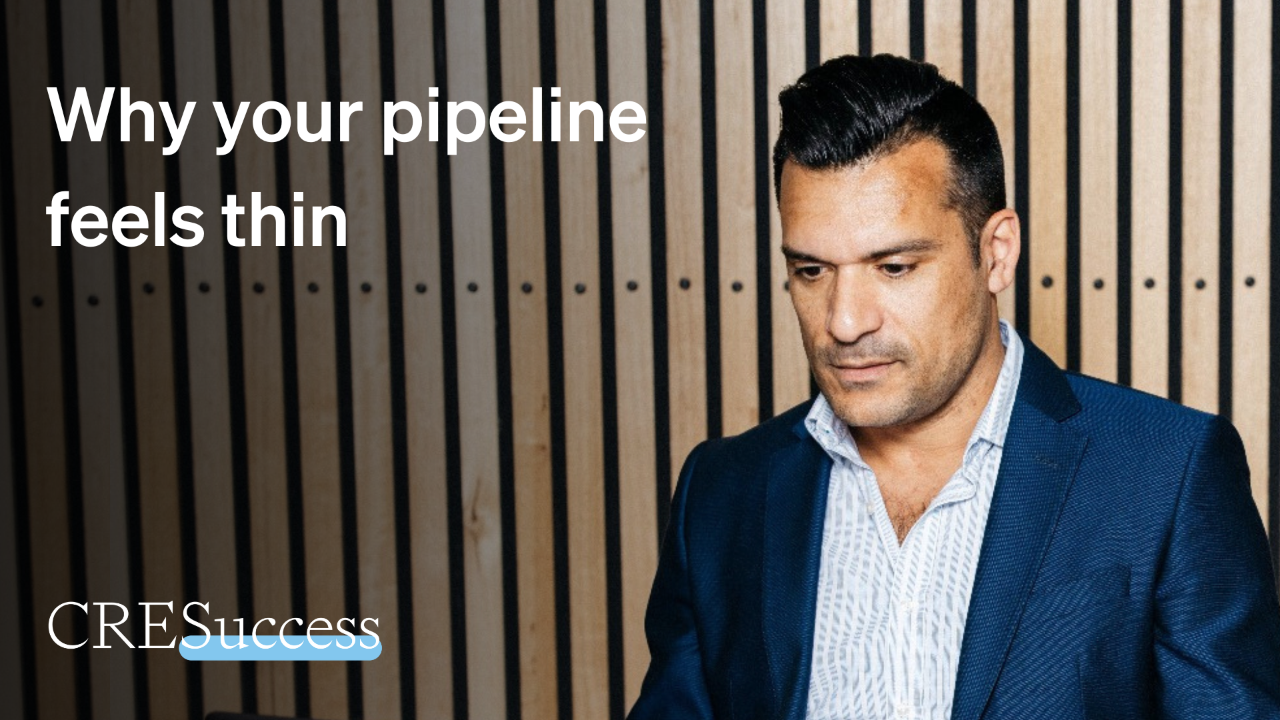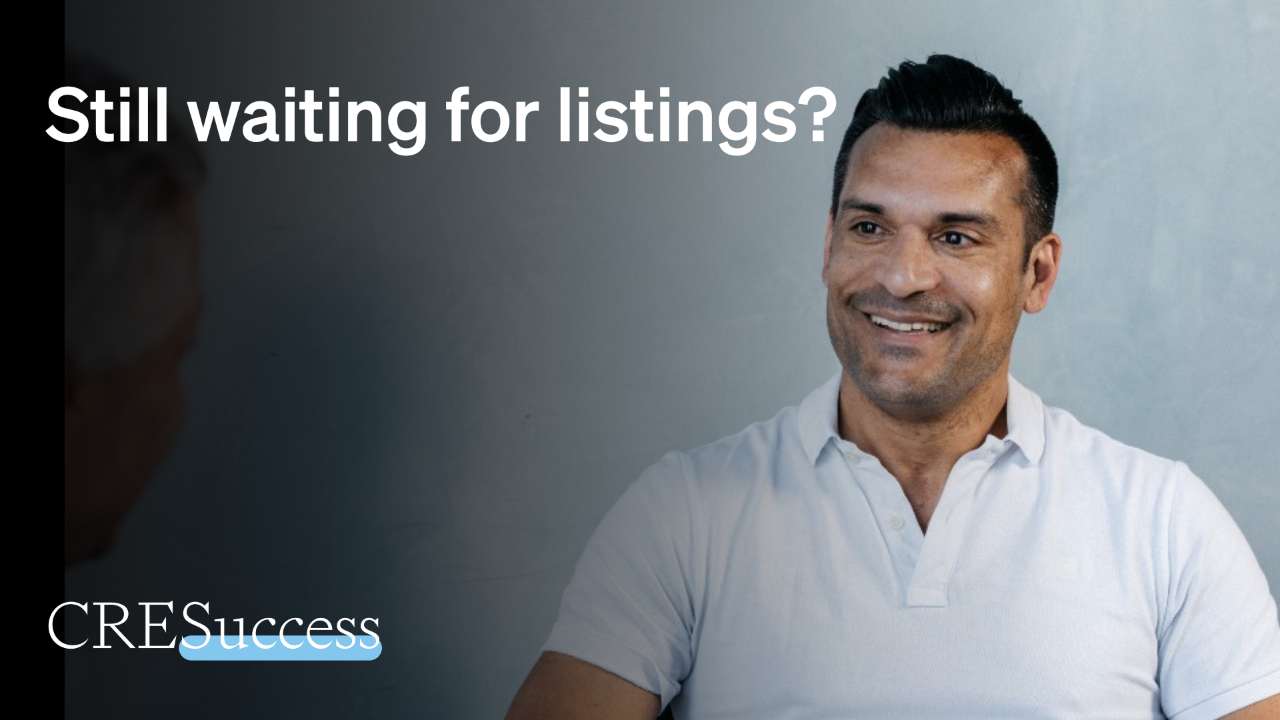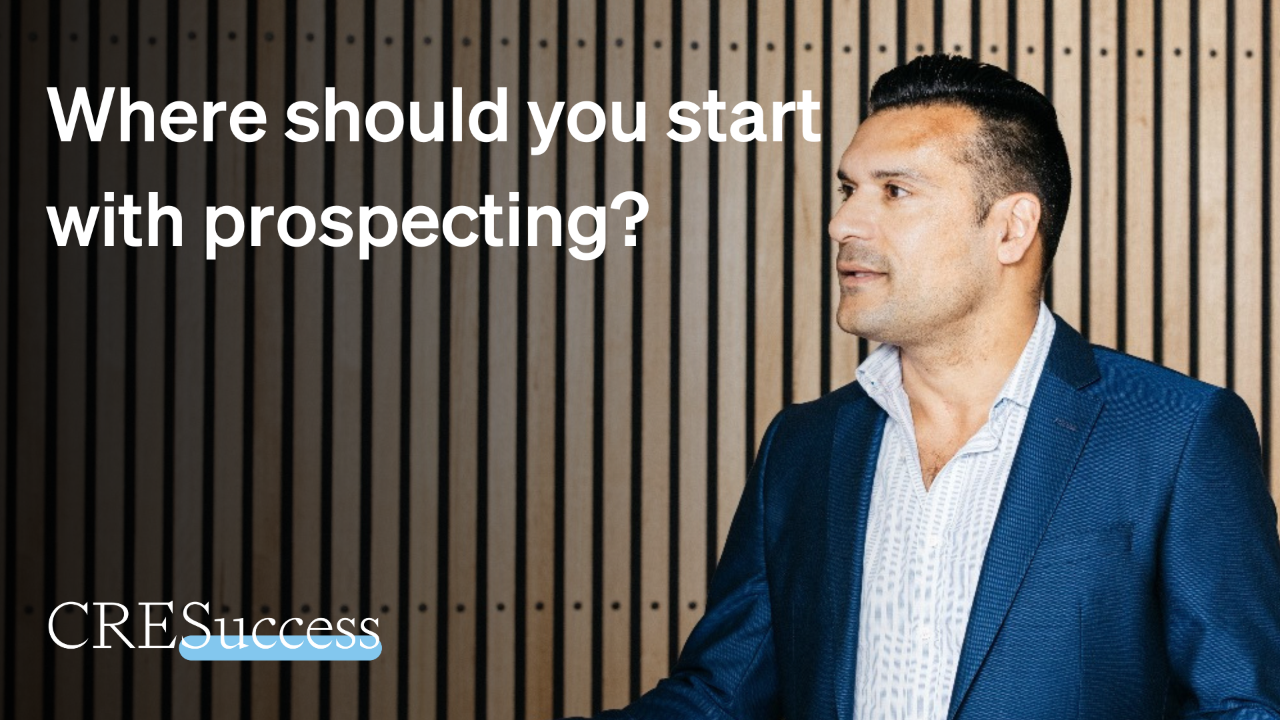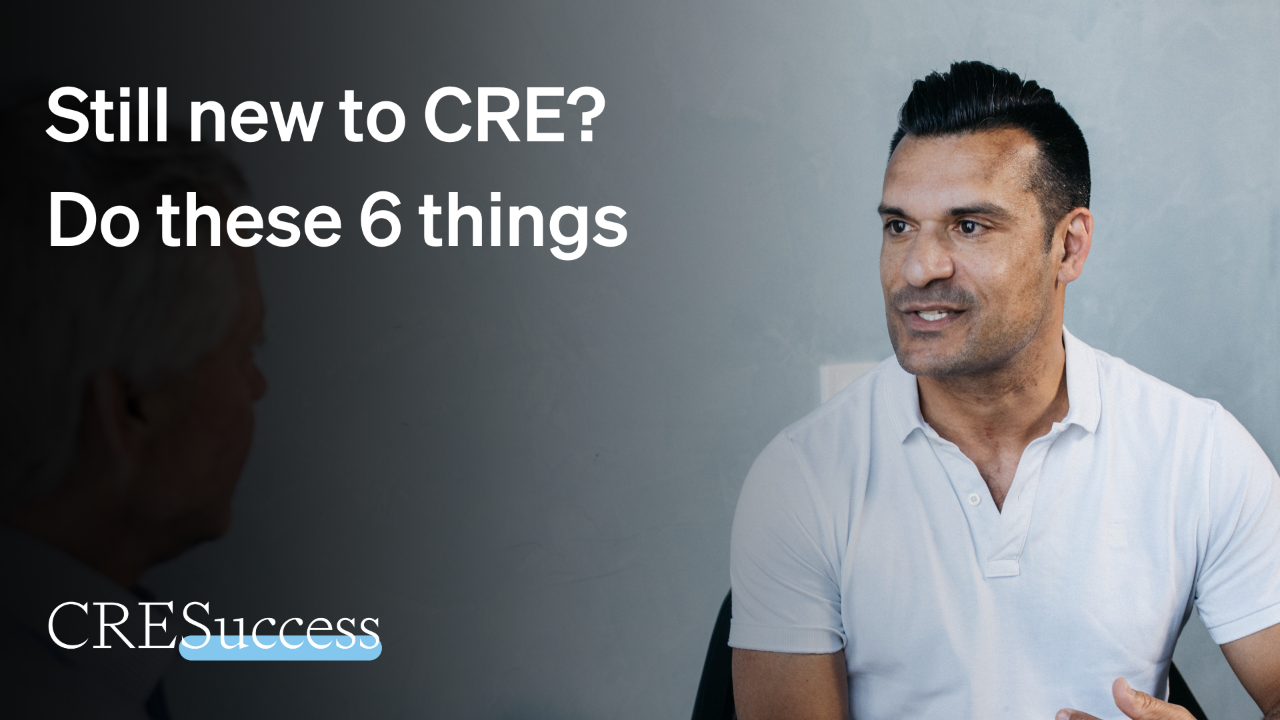The unlikely leadership lessons I learned from my surgeon.
Jun 11, 2025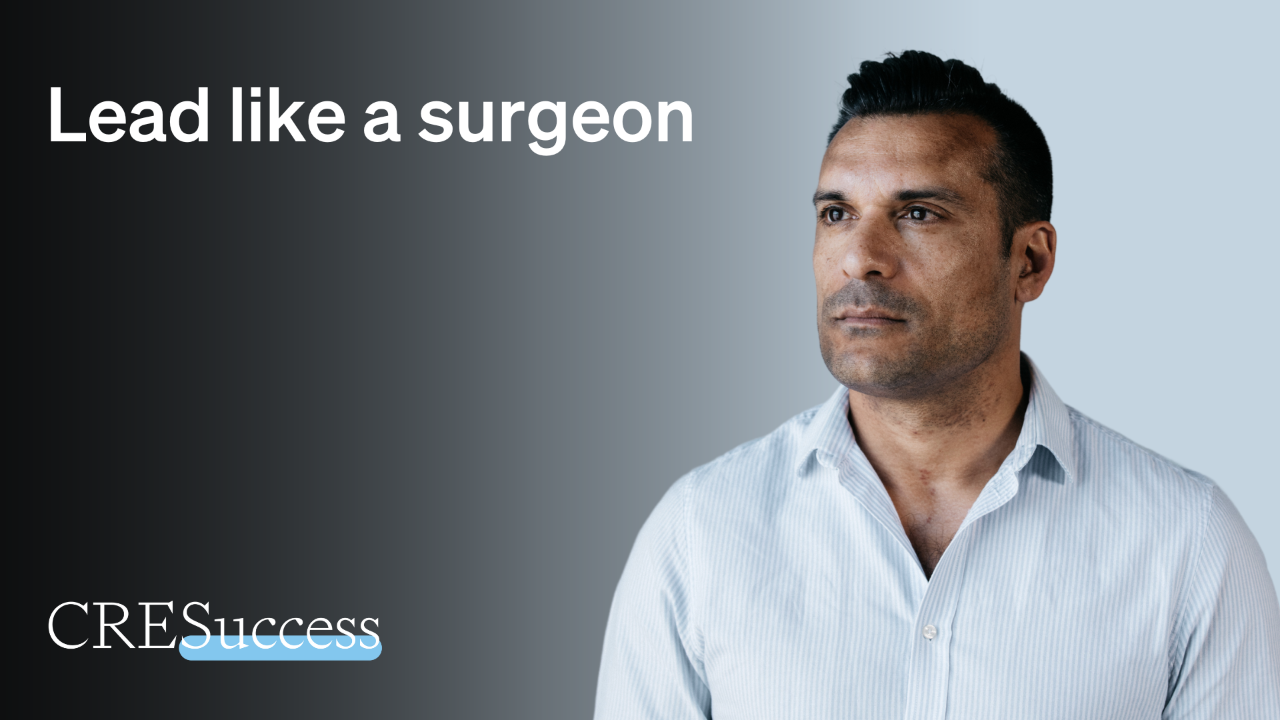
CRE Success Principle: By positioning yourself as an expert, you create trust, stand out from generalists, and have the ability to attract premium clients, without having to go after every deal.
What do surgeons and commercial real estate leaders have in common? More than you might think.
In episode 224 of Commercial Real Estate Leadership, I share a story about my surgeon that got me thinking about authority, positioning and professionalism.
Surgeons don’t market themselves aggressively, yet they have built-in trust and command premium fees. Why? Because they operate exclusively within their zone of genius, set clear boundaries and protect their time.
But while surgeons have undeniable prestige, in commercial real estate we have the ultimate advantage: leverage. We can build and scale a business far beyond our individual production.
This episode will teach you how you can do this through sharpening your market positioning, establishing boundaries (such as setting a “get out of bed” fee) and operating at a higher professional standard.
You’ll learn how to build trust, amplify your reputation and lead your team with more focus and confidence.
You don't need a medical degree to command a surgeon's income or authority; you just need to strategically position yourself, protect your time, and lead like the specialist you are.
Episode transcript:
So, here's what happened. I had a Telehealth appointment with my surgeon at 9:00 AM.
Now, he didn't call me at 9:00 AM, and he hadn't called me by 10. So, I called the office just to clarify that I did have the appointment, which I did, and they told me he's running a little bit late and he'll call me back.
By the afternoon he still hadn't called me back and I just on with my day and I kind of forgot about it actually, which I give myself credit for because you know, the old me would've stewed over that and got angry, but I kind of just forgot about it and got on with my day.
And then at 7:48 that evening, the phone rings, and who should it be? But it's my surgeon.
And you know what? I didn't even complain. I didn't even call him out because he's a surgeon, right? Surgeons are busy, important people. We work around them.
But it did get me thinking, how do surgeons, I guess, get away with that? Why don't more commercial real estate principals just show up with that same level of authority?
In this episode, I want to dig into what surgeons and commercial real estate leaders have in common, what sets them apart, and also what you can learn from the way surgeons operate their business and the way that they market their authority, not the way that they manage their time and keep patients waiting, but how they achieve what they do professionally without doing any marketing at all.
Hello. Welcome to episode 224 of Commercial Real Estate Leadership. My name is Darren Krakowiak, I'm your host. Really appreciate you joining us for another episode.
I do want to say a quick thank you to our sponsor, which is LJ Hooker Commercial. They just completed a 13-series sponsorship agreement with us, and they've renewed for another 13 episodes. So really pleased to have LJ Hooker commercial on board for another three months.
So, we're talking about surgeons today and how people put them up on a pedestal, and you know, they've got a lot of social status, right?
There is, I think, built-in authority that comes from being a surgeon, and that probably is fair because there's a high barrier to entry to becoming a surgeon.
They do years and years of studying, and there's some pretty intense exams and I guess professional hurdles that they need to clear before they get to cut people open.
In fact, I've got a, one of my daughter's friends, the father who I know pretty well and friends with, he's a psychiatrist who moved to Australia from the UK. And he's just been telling me about how difficult the equivalency test is to actually be able to clear that final hurdle to be a fully-fledged psychiatrist here in Australia.
So, there's a reason why people do value surgeons, and they deserve a lot of the, I think, status and also the income that they make, right?
When you look at a list of the highest-earning professions in Australia, surgeons are always at or near the top of the list.
And the other thing about surgeons is that people trust them. People trust them, I think, with their lives, but also, they just trust them. It's a trustworthy profession. They're treated with deference by their clients. You know, patients rarely shop around.
You might get a second medical opinion, but you probably not really like interviewing three or four surgeons before you go with the one that you are going with, like you would, say, procuring a commercial real estate agency.
One thing I learned recently is that surgeons also have some other privileges that I didn't know about.
For example, did you know that lenders give them preferential treatment when it comes to loan to value ratios. I didn't know that. Right?
So, there's some good little perks that come from being a surgeon. I think, you know, in society they're probably a bit of a, a protected category of profession, and they are lifesavers, right?
So, they literally have people's lives in their hands, and that might be why they get treated that way.
But it's not all upside to being a surgeon, right? So, before we say, well, we've got to go and finish up in commercial real estate and start becoming surgeons, they have a limited ability to scale their income.
I'd say especially in Australia, there's a certain amount that they can charge. And I remember thinking when I had surgery last year that the amount that he wanted to charge me probably was at the lower end of my expectations.
Surgeons don't get paid without doing the work, right? They do have to do some work. They've got a little bit of rigidity in their lives. They can't just call in sick and go out and have a wild night out and rock into work the next day.
They've got serious responsibility with the work that they do, and they've also, I guess, got the risk of professional indemnity. They're open to lawsuits if they make mistakes. It's a high-stakes, high-stress profession where people burn out.
Now let's compare that to commercial real estate.
We have so many more paths to income and to business ownership. Even if you are not that great, you can go pretty far in commercial real estate. You could become a commercial real estate principal.
I think in order to become a surgeon who has his own practice and who has surgeons working under him, well, you've got to be a pretty good surgeon, right? Not necessarily the case in commercial real estate.
We also have much more freedom. We've got more control over our time, even though our clients expect to see us on time.
We've got, I guess, more flexibility in how we work, and we've also got more leveraged ways to grow. We can leverage money to purchase rent rolls.
We can leverage people to help us deliver and also do what we do. We can leverage content to share processes and to deliver messages on multiple platforms, right?
I record this podcast, and it goes out to hundreds of people. And we can also use software to automate many parts of the process.
So, surgeons can't scale their business the same way that a commercial real estate principal can.
They can, however, protect their time. Now, if you're a surgeon who's dealing with emergencies, maybe then you're going to have to override the protecting of your time.
But for the most part, surgeries are scheduled and surgeons decide when they work, and they've got teams that help them with administration and everything else that goes on in the business.
Like, for example, after surgery, you might go out and like get your wounds redressed. That's not the surgeon; that's the nurse in the surgeon's office who does that.
And they do that so they can stay within their zone of genius. Right? They show up and they do their highest value work and they leave the rest to others.
And I reckon if you had a surgeon who was also answering their phone and booking in the next appointment and running their reception, you probably might be a little bit concerned about their skills as a surgeon.
So that's an important lesson, I think, that we can learn from them. Their commitment to specialisation is what puts them in a special category.
It's what elevates their status and in terms of their earnings, is what ensures that they can maximise their earnings because they are operating most of their time doing the thing that makes them the most money, which is doing surgery.
So even though they've probably got less opportunities to leverage or apply leverage and scale their business, the times that they are on the tools is doing what they get paid the most to do.
On the plus side, if you're a surgeon, you probably don't really need to advertise that much, whereas commercial real estate agents probably do need to advertise. Or perhaps maybe we can advertise, and it's not seen as weird to be advertising, right?
You don't scroll through your feed and see much, and maybe plastic surgeons you see a little bit, but otherwise you don't really see much from surgeons, right?
By the way, if we're not investing in marketing beyond vendor-paid advertising, which is a form of leverage, and that's something that we should be doing.
Surgeons, though, they create authority through their positioning, right? They're positioning themselves as the specialist in a certain area of surgery.
There's an exclusivity element, right? They select their clients. They choose who they want to work with. There are boundaries, they only consult on certain days, and there's also the results that they get, which are obviously life-changing.
So, what is it that we can learn in commercial real estate? Well, we can own a niche, right? That doesn't stop us from doing deals outside that niche, but we can position ourselves as the specialist for particular types of property and services.
We can protect our time. Knowing the value of your time is the first step to being able to make decisions that protect your time.
The value of your time is based on the rule of 2,000 hours. Your total income over a year divided by 2,000 will give you an idea of what your effective hourly rate is.
Of course, you can also have boundaries in terms of what it is that you work on. And a boundary that I like to teach my clients and ones that I used to practice when I was in commercial real estate was something called the get out of bed fee.
So, if a fee was below a certain amount, it wouldn't be a deal that I would touch. And at the same time, if there's certain deals that are being performed by your team, if they're below a certain threshold, then they should probably have a limited amount of involvement from you.
And of course, we can also build trust through the results that we get for our clients, and then we can amplify that through testimonials, referrals, just encouraging others to tell the story.
So, what's the point of this story, comparing commercial real estate principles and high-performing agents to surgeons?
We don't need a medical degree to command a surgeon's income, which is great, right? We can, though, be highly professional and operate with authority if we choose to.
If we own our market positioning and lean into it, if we set boundaries like the get out of bed fee, and we stop compromising on our worth by setting the fee as the fee and sticking to that, we are positioning ourselves as a principal, not just a participant in the market. And you're starting to lead more like the professional that you are.
So, surgeons might have the prestige, they might have the trust, they might have the power to call someone back at 7:48 PM when the appointment was at nine.
But commercial real estate principals: Well, we've got the leverage. We've got the freedom to scale a chance to build a business beyond your own production, and also the opportunity to lead that business in a way that does change people's lives, but without the medical risk.
You don't need to wear scrubs; you don't need to hold a scalpel to operate with authority. You just need to own your positioning, protect your time, and lead like the professional, the specialist, that you are.
Hey, thanks so much for listening. If you've got something out of this episode, I'd love it if you would share it with a commercial real estate principal who needs to hear this message.
For now, that is our episode. Thank you so much for listening, and I will speak to you soon.


